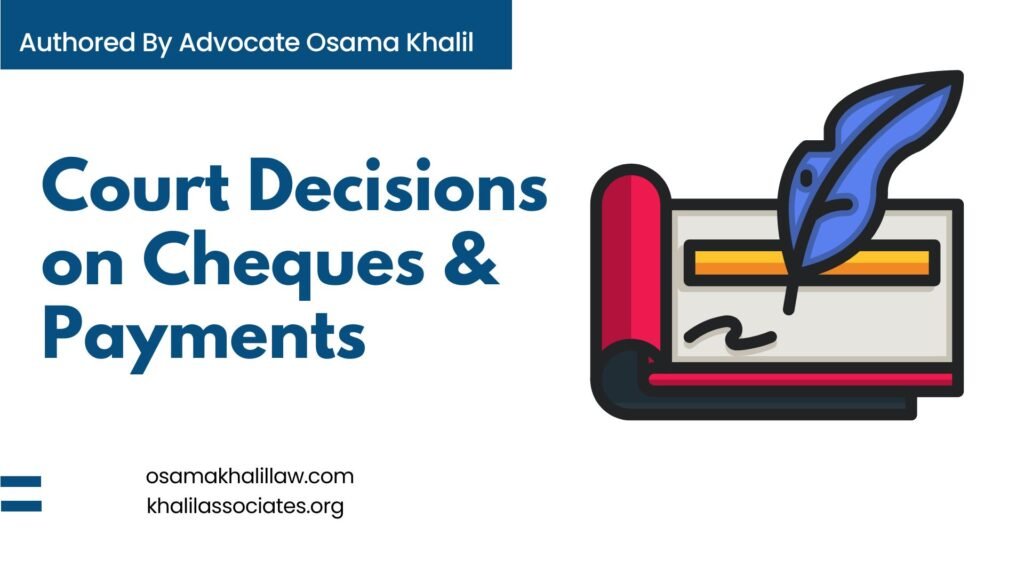
Cheques are a common form of financial transaction, but their misuse or misunderstanding can lead to legal disputes. A recent case of “Cheque Recovery Suit” from the Lahore High Court sheds light on the proper procedure for handling cheques when partial payments have been made. This article explains the judgment in simple terms, ensuring that readers understand its implications.
Case Background
The case involved a legal dispute between Muhammad Afzal (the appellant) and Binyameen Sajid (the respondent). Muhammad Afzal had filed a lawsuit seeking to recover Rs. 11,800,000 based on a cheque issued by Binyameen Sajid. The cheque, drawn from KASB Bank, was intended to be cashed on September 21, 2016. However, the dispute arose when the cheque was presented for full payment despite prior partial payments.
The respondent contested the case, arguing that the appellant had already received payments through multiple cheques from the same cheque book. The trial court dismissed the suit, leading the appellant to file an appeal before the Lahore High Court.
Key Legal Issue: The Role of Section 56 of the Negotiable Instruments Act, 1881
At the heart of the case was Section 56 of the Negotiable Instruments Act, 1881. This section states that when a cheque has been partially paid, an endorsement must be made on it before it can be negotiated for the remaining balance. This ensures transparency and prevents the payee from attempting to claim the full amount again.
The appellant, Muhammad Afzal, had received multiple payments through different cheques issued by the respondent. However, he did not follow the proper procedure of endorsing the cheque for only the remaining balance before presenting it for encashment. As a result, the court ruled that he was not legally allowed to present the cheque for full payment or file a summary suit under Order XXXVII of the Civil Procedure Code (CPC).
The Court’s Decision
The Lahore High Court examined the evidence and upheld the trial court’s decision. Since the appellant had already received part payments and had not endorsed the cheque accordingly, he could not lawfully demand the full amount. The proper course of action was for him to file a regular recovery suit in a civil court, rather than using the summary procedure under Order XXXVII, which is reserved for clear-cut cases of unpaid negotiable instruments.
The court further stated that the trial court should have returned the plaintiff’s case under Order VII, Rule 10 of the CPC. This rule requires cases to be filed in the correct forum, meaning that since the appellant needed to recover a balance rather than the full cheque amount, the civil court was the right place for his lawsuit.
Impact of the Judgment – Cheque Recovery Suit
This ruling is significant because it clarifies the legal position on handling cheques after partial payments. It highlights that:
- If partial payments have been made, the cheque must be endorsed before presenting it for encashment.
- A lawsuit under the summary procedure (Order XXXVII) cannot be filed if the full cheque amount is not due.
- The correct forum for recovering the remaining amount is the civil court, not the summary court.
Lessons for Business and Financial Transactions
For individuals and businesses dealing with cheque payments, this judgment serves as a crucial reminder to follow proper legal procedures. When issuing or receiving cheques:
- Always endorse the cheque if a partial payment has been made before presenting it for encashment.
- Keep clear records of payments received to avoid legal disputes.
- If recovering unpaid amounts, ensure that the lawsuit is filed in the appropriate court.
Conclusion
The Lahore High Court’s decision in Muhammad Afzal vs. Binyameen Sajid clarifies the legal obligations regarding negotiable instruments. This ruling emphasizes that proper endorsement and legal procedures must be followed when dealing with cheques that have been partially paid. By adhering to these legal principles, individuals and businesses can prevent unnecessary disputes and ensure smooth financial transactions.
For professional assistance with financial services and related legal matters, contact Osama Khalil, Lawyer & Legal Consultant. You can reach him at:
Phone: +92-316-1829946 | +92-307-2732223
Email: osamakhalil9444@gmail.com | contact@khalilassociates.org
